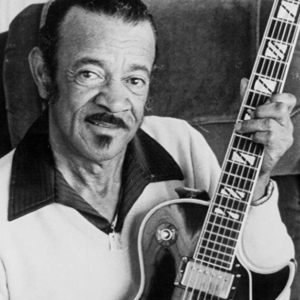
Pee Wee Crayton was one of the brightest stars on the West Coast blues horizon when his 1948 recording of “Blues After Hours” reached No. 1 on Billboard magazine’s chart for “race records” (renamed “rhythm & blues” in 1949). It remains the only instrumental by a guitarist to ever occupy the top R&B spot. Although his run on the charts ended in 1950, Crayton continued to display a creative flair on later records and delivered many a memorable performance. Guitarists Lowell Fulson, Johnny Heartsman, Mickey Baker, Doug MacLeod, and others have cited him as an inspiration, and Sun recording artist Billy “The Kid” Emerson claimed that Elvis Presley developed some of his moves after seeing Crayton perform in Memphis. Crayton’s guitar riffs have been cited as the basis for some of Chuck Berry’s, and even for the Beatles’ “Revolution” intro.
It adds up to an impressive legacy for a bluesman who said he had only been playing guitar for about four years when he recorded. He was born Connie Curtis Crayton on December 18, 1914, in Liberty Hill, Texas, near Rockdale, just east of Austin, where he grew up and learned a little trumpet, ukulele and banjo. Moving to Los Angeles, he worked as a janitor and chauffeur and then headed north to a shipyard job in Vallejo during World War II, and delved into the Bay Area blues scene. With tutelage from T-Bone Walker and jazz guitarist John Collins, Crayton developed his own approach on guitar, incorporating their sophistication but picking with a harder edge than his mentors, sometimes bending strings much in the way B.B. King would soon be doing.
His first attempts at recording didn’t amount to much, but he earned the distinction of playing on two No. 1 hits in 1948 by providing the guitar work on Ivory Joe Hunter’s “Pretty Mama Blues,” which peaked just six weeks before “Blues After Hours.” Crayton recorded his chart-topper for the Modern label in Los Angeles in addition to two other Billboard hits, ”Texas Hop” and a vocal ballad, “I Love You So.” Although he considered his skills rudimentary at that point, he was hailed as a guitar phenom in publicity for national tours that followed, and guitar manufacturer Leo Fender presented him with a prototype Stratocaster and amp. His success also occasioned threats of lawsuits, including one from an Oakland company that had signed him to a contract, but he continued recording more instrumentals and vocals for Modern. To his frustration, no further hits came, for Modern or for a myriad of other labels, despite the quality and increasing expertise he brought to his music. But with the songwriting and management support of his wife Esther, he maintained his performing career in Los Angeles as well as in Detroit and Des Moines, even during lean years when he drove a truck to make ends meet. Extra income came from teaching guitar and winning money on the golf course.
Crayton’s legendary status brought him renewed attention and several albums and festival appearances in later years. His periodic guitar battles with longtime friend T-Bone Walker always made headlines. Crayton died in Los Angeles on June 25, 1985, just after returning from a triumphant return to his hometown of Austin to play at Antone’s. In his honor, a host of the area’s best guitar slingers later gathered to stage the “Pee Wee Crayton Battle of the Blues Guitars.”
